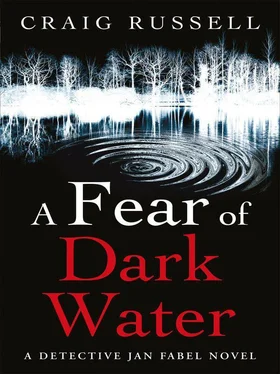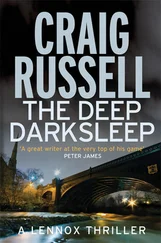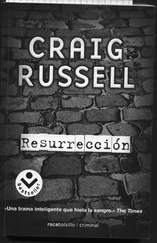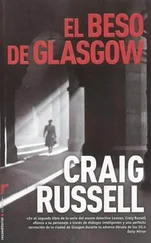Craig Russell - A fear of dark water
Здесь есть возможность читать онлайн «Craig Russell - A fear of dark water» весь текст электронной книги совершенно бесплатно (целиком полную версию без сокращений). В некоторых случаях можно слушать аудио, скачать через торрент в формате fb2 и присутствует краткое содержание. Жанр: Триллер, на английском языке. Описание произведения, (предисловие) а так же отзывы посетителей доступны на портале библиотеки ЛибКат.
- Название:A fear of dark water
- Автор:
- Жанр:
- Год:неизвестен
- ISBN:нет данных
- Рейтинг книги:5 / 5. Голосов: 1
-
Избранное:Добавить в избранное
- Отзывы:
-
Ваша оценка:
- 100
- 1
- 2
- 3
- 4
- 5
A fear of dark water: краткое содержание, описание и аннотация
Предлагаем к чтению аннотацию, описание, краткое содержание или предисловие (зависит от того, что написал сам автор книги «A fear of dark water»). Если вы не нашли необходимую информацию о книге — напишите в комментариях, мы постараемся отыскать её.
A fear of dark water — читать онлайн бесплатно полную книгу (весь текст) целиком
Ниже представлен текст книги, разбитый по страницам. Система сохранения места последней прочитанной страницы, позволяет с удобством читать онлайн бесплатно книгу «A fear of dark water», без необходимости каждый раз заново искать на чём Вы остановились. Поставьте закладку, и сможете в любой момент перейти на страницу, на которой закончили чтение.
Интервал:
Закладка:
Roman found himself totally immune to the paranoia of the conspiracy theorists and the ludicrous spiritual significance that New Agers attached to the innate beauty of some quantum theories. This, he knew, was highly unusual for his type. Schizotypes were famous for their magical thinking, as psychiatrists called it: beliefs in spooks and ESP; in UFOs and telepathy and telekinesis. They also had a strong tendency towards paranoia. But Roman had known that all these things were crap. There were no such things as ghosts or poltergeists or God. He found he could do all the magical thinking he needed within the realms of science. A Big Bang in the Void, not a Bump in the Night.
It was this knowledge — that physicists were now treating the universe as composed of information rather than matter — that led him to devise his concept of ‘cyber-radiative signature’. Maybe, thought Roman, the Bostrum Hypothesis was right and the reality we experienced was not reality after all, but a highly sophisticated ancestor simulation. In which case, mankind was perhaps about to create its own simulated universe within a simulated universe. And the foundations of that simulation would be the internet.
This thought, in turn, brought him to the idea that people were already beginning to ‘exist’ on the internet to some degree or other. There were individuals who interacted with each other exclusively through the internet; who had never met and never would meet in real life. If a personality was the sum of other people’s perceptions, then there were personalities that existed only in cyberspace. This was not mediated reality, it was not even virtual reality. It was the beginning of an actual and absolute — if alternate — reality.
But it was not a reality yet shared by all. If you were over fifty, then it was most likely you had little cyber-identity or none at all; the younger you were, the more likely you were to use the internet as a major social medium, and the more ‘mass’ your cyber-radiative signature had. He had started to think about the internet in the same way that physicists had once thought of space-time. It was a continuum and within it people and ideas had a mass that created its own radiative field. Every degree of connection was there, each person connected to a circle of others, each circle intersecting with other circles, spreading wide across cyberspace. And at the heart of each presence was a name: the quantum of identity, the smallest indivisible self. People became a scattering of facts. The nucleus was their name, the core of their identity, but they would appear elsewhere, with different usernames, existing simultaneously in several locations but never really existing in any. Exactly, Roman realised, like quantum superposition.
But no matter how diffuse or nebulous an identity, or how misleading the username at its core, Roman would seek it out and give it form. In between his wide-ranging research, his surfing and stealing, he would pick a person at random from a social network. He would seek out commonalities, shared friends, past locations. On many occasions he could access bank accounts, club memberships, charity donations. He had software that could run through a million alphanumeric password permutations a minute and, he had found, once you cracked someone’s password for one site, you usually found they used it for a number of others, sometimes all of the secure sites they used. Most people would use only two passwords, both of which would be chosen for ease of recall. And that made them easy to break. It was amazing what you could find out, even without delving too deep. The web, Roman had realised, brought out the egotist in everyone. Every voice that was unheard in the real world shouted its opinions here.
But he could not find her. Anywhere.
She simply did not exist.
The first thing he had done was to disable the roaming function on the mobile phone he had picked up in the cafe. Roman had become more and more convinced that the beautiful woman who had left it behind had done so deliberately, and the only reason he could think of was that she had been afraid of being tracked through it. He himself had Enhanced Cell Identification software that could pinpoint a mobile to within ten metres; if what he had guessed about the woman was true, then someone, somewhere would be trying to track down her phone. Roman had been very careful about switching it on: it was not necessary for a call to be made or received for it to be traced. As soon as the Nokia was switched on, it would emit its roaming signal, seeking out a network to connect to; so the first thing he did was to dismantle it and remove its antenna.
And that was when he found it: a non-standard GPS chip. Someone had implanted an even more accurate form of tracer on the phone. Once he was into the phone, Roman removed the GPS chip, examined it and destroyed it. He felt himself sweating. More than usual. There was something going on here that was making him feel uneasy. Very uneasy.
With the tracking disabled, he was able to download the phone’s contents onto his computer, decrypting any hidden or protected information.
It did not take Roman more than an hour to grow to hate the woman he had seen in the cafe. He hated her because she really had been in grave danger. And by leaving her phone for him to find, she had transferred that danger to him.
He stared at the computer screens before him. His portal to another universe. His element. His safe place. But even there — especially there — they could find him.
And Roman was in no doubt that if they did find him, they would kill him.
Chapter Twenty-Four
The interview lasted all morning and into the afternoon. Van Heiden arranged for lunch to be brought up from the canteen.
It was the strangest position for Fabel to find himself in. No one actually used the word suspect, but that was the noun Fabel would have attached to himself. Before they had started to discuss Muller-Voigt’s death, van Heiden had actually reminded Fabel of his rights under the Basic Law of the Federal Republic.
‘Just to keep things right,’ van Heiden had said. Presumably that was why he had also had their conversation recorded. Menke, the BfV agent, had sat in on the discussion.
‘You cannot seriously be suggesting that I had anything to do with Muller-Voigt’s death?’ Fabel had protested.
‘Of course not,’ said van Heiden. ‘But we have to be seen to do this all above board.’
So they had sat and gone over every detail of every conversation Fabel had had with the Senator. When he had left to visit him, when he had arrived.
‘I wouldn’t have thought it would have taken you so long to get there,’ said Menke.
‘I lost my way a little,’ explained Fabel. ‘I ended up going through the centre of Stade.’
‘But you’d been to Muller-Voigt’s house before.’
‘A couple of years ago, yes.’
Van Heiden, not the most extemporary of thinkers, had a list of questions prepared on a notepad. He worked his way through them, taking notes, asking supplementary questions. Pausing to frown every now and then. Menke contributed little, but Fabel noticed that the few questions he did ask were much more relevant than those that Fabel’s boss asked. At three-thirty van Heiden switched the recorder off, indicating the end of the formal interview.
‘Well?’ asked Fabel. ‘Do I go back to my desk or down to the holding cells?’
‘This is no laughing matter,’ said van Heiden.
‘I do not, in the slightest, find this funny. A man has been murdered within an hour of my talking to him, from what we can gather. He also happened to be a man I rather liked. And someone, somehow, is trying to frame me for it. And implicate me in a serial-murder case I’ve spent the last six months of my life working on. No, Herr Criminal Director, I do not find this a laughing matter.’ Fabel was aware he had started to raise his voice.
Читать дальшеИнтервал:
Закладка:
Похожие книги на «A fear of dark water»
Представляем Вашему вниманию похожие книги на «A fear of dark water» списком для выбора. Мы отобрали схожую по названию и смыслу литературу в надежде предоставить читателям больше вариантов отыскать новые, интересные, ещё непрочитанные произведения.
Обсуждение, отзывы о книге «A fear of dark water» и просто собственные мнения читателей. Оставьте ваши комментарии, напишите, что Вы думаете о произведении, его смысле или главных героях. Укажите что конкретно понравилось, а что нет, и почему Вы так считаете.












